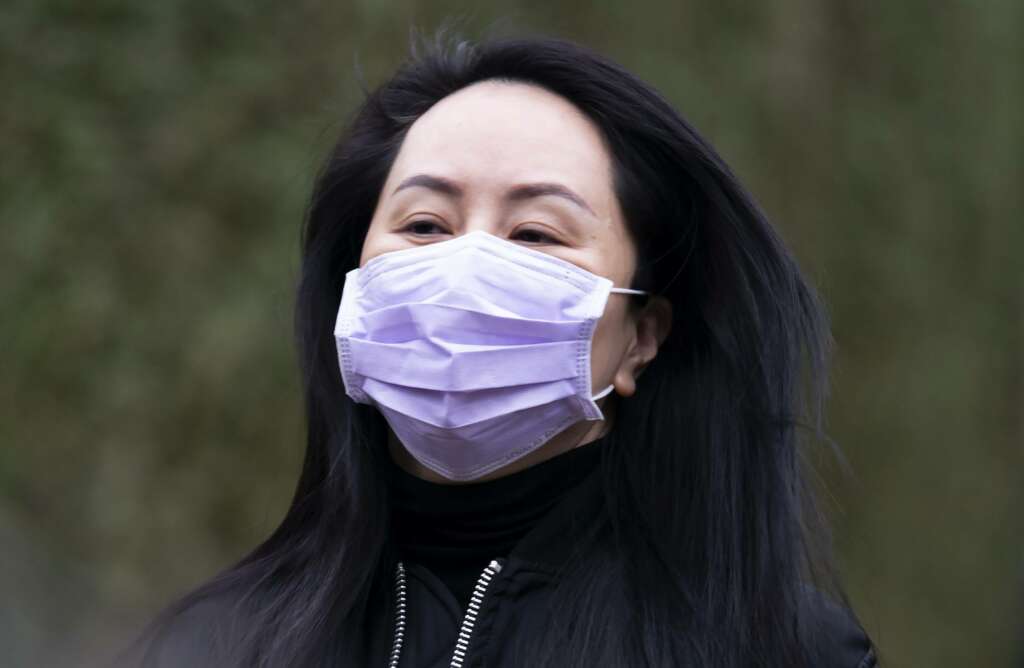
VANCOUVER, British Columbia (AP) — Lawyers for a senior executive for Chinese communications giant Huawei Technologies were in court Monday arguing evidence should be introduced which would undermine the case to have their client extradited to the U.S.
Canada arrested Meng Wanzhou, the daughter of Huawei’s founder and the company’s chief financial officer, at Vancouver’s airport in late 2018. The U.S. wants her extradited to face fraud charges. Her arrest infuriated Beijing, which sees her case as a political move designed to prevent China’s rise.
The U.S. accuses Huawei of using a Hong Kong shell company called Skycom to sell equipment to Iran in violation of U.S. sanctions. It says Meng, 49, committed fraud by misleading the HSBC bank about the company’s business dealings in Iran. Much of the case centers around an August 2013 PowerPoint presentation made to a HSBC executive during a lunch in Hong Kong.
Defense lawyer Frank Addario asked the court to admit evidence he says shows officials with HSBC were aware of Huawei’s connection to Skycom and another company called Canicula Holdings Inc.
“It was widely known in the bank … that Huawei owned Skycom,” Addario told Associate Chief Justice Heather Holmes. “It sold Skycom to Canicula and thereafter Huawei controlled Canicula’s account at the bank.”
Addario said by omitting this evidence, the U.S. misled Canadian courts.
“The case put to you for the prosecution is the bank’s knowledge came from all these misleading statements by Huawei employees generally,” said Addario. “Once you see all this evidence the picture that emerges is a different picture abut the knowledge of HSBC employees generally and the decision makers.”
Canadian government lawyer Robert Frater told Holmes an extradition hearing is not a trial and said some of Addario’s comments are standard defense cross examination material.
“It is up to a trial to decide if a witness is credible and to determine what officials knew at a certain time. What my friend wants to do is to argue the trial issues,” Frater said.
Meng attended the hearing wearing a mask and an ankle tracking bracelet. She followed the proceedings with an interpreter while reading documents on her lap and taking sips of water.
Over the next several weeks, Meng’s defense team will present several justifications for halting the extradition proceedings.
On Wednesday they will be back in court to argue her arrest was politically motivated and will point to comments made by former U.S. President Donald Trump that he was using Meng as a bargaining chip to force a better trade deal with China.
Canada’s attorney general said in court documents that Trump’s comments were public statements by a president no longer in office about a possible intervention that never occurred.
Later this month, Meng’s lawyers will claim an abuse of process, saying Canada Border Services Agency officers detained and questioned Meng without a lawyer, seized her electronic devices and compelled her to give up the passcodes before her official arrest.
Her lawyers also contend the U.S. is exceeding the limits of its jurisdiction by prosecuting a foreign citizen for actions that took place in Hong Kong and that Canada was misled by the U.S. about the strength of its case.
Meng’s arrest has soured relations between Canada and China. In apparent retaliation, China detained former Canadian diplomat Michael Kovrig and Canadian entrepreneur Michael Spavor. China has also placed restrictions on various Canadian exports to China, including canola oilseed. China also handed death sentences to four Canadians convicted of drug smuggling. Kovrig and Spavor remain jailed. Meng remains free on bail in Vancouver and living in a mansion.
Copyright © 2021 . All rights reserved. This website is not intended for users located within the European Economic Area.
